The XL Giro d'Italia report card, part one
Plus, new episode online now: Matt White's verdict on the opening Grand Tour of 2025
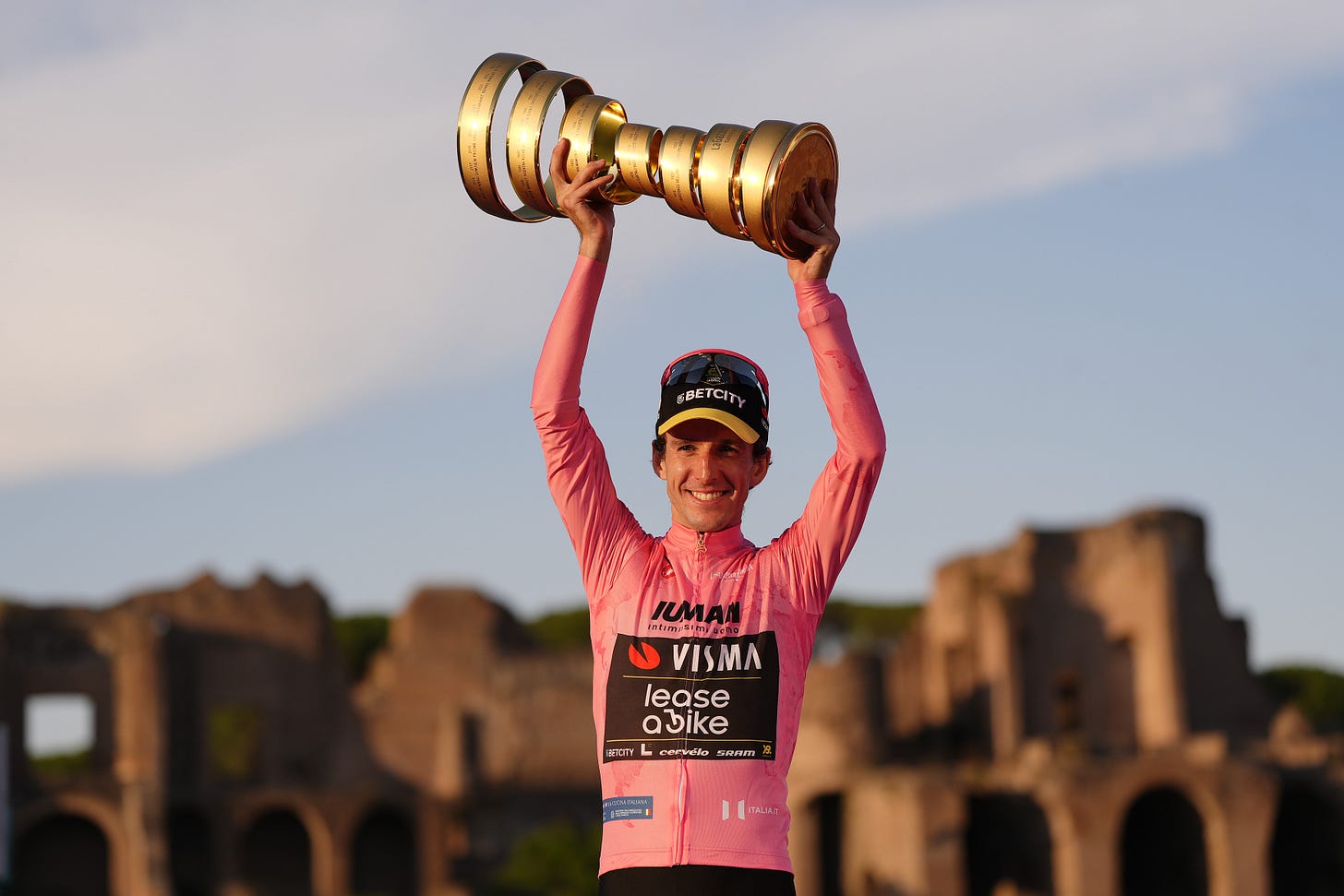
by Lionel Birnie
How good was the Giro?
It was a good Giro with three sensational stages. Daniel Friebe awarded three wine glasses out of five and, while we can debate whether it was worthy of an extra glass for the penultimate stage alone, there were many aspects that were lacking drama. Three sensational stages just about compensated for quite a few disappointing ones. The points and mountains competitions had no sense of jeopardy. The lack of opposition to Mads Pedersen and the absence of a real battle between the sprinters made for a familiar feel to much of the first week. There was relatively little GC action until stage 16. However, the three stages that were good were very, very good, and the finale was about as exciting as Grand Tour racing in the mountains gets.
Was Simon Yates a worthy winner?
Absolutely. The redemptive narrative arc was compelling, especially because Yates won the Giro on the climb that had been his undoing in 2018, although there’s no real sense that he has been carrying the burden of that defeat for the past seven years. He moved past that when he won the Vuelta a España later that same year. There was something quite reassuring about watching Del Toro falter due to tactical indecision. It was a reminder that elite level bike racing is not just about physical strength, it’s about judgement and an ability to weigh up risk and reward when under tremendous pressure.
Best stages
3rd – Stage 9, Gubbio–Siena
The gravel stage in Tuscany had all the drama and excitement we could have hoped for. Yes, there was a costly crash and puncture for Primož Roglič, reviving the debate about whether gravel (or cobbles) belong in the Grand Tours. That strikes me as an absurd argument for a sport that depends almost entirely on attracting viewers for its survival. The ‘Strade Bianche’ was appointment viewing and the action kept people hooked all Sunday afternoon. No one wants to see the sport reduced to a farcical circus but racing on different surfaces is a long way from that. All Grand Tour stages are a test of strength, skill, teamwork and luck – it’s just some of those elements are heightened on the gravel. Even the battle for the stage was riveting. After a spring of questions and doubts, Wout Van Aert won his first race since last season’s Vuelta and Isaac Del Toro confirmed his arrival as the next bright young thing. The stage even foreshadowed what was to come. Who could have known in Siena that a fortnight later the Belgian would play such a key role in Del Toro’s undoing on the Finestre?
2nd – Stage 16, Piazzola sul Brenta – San Valentino
A stage that had everything. Bad weather at the start, Roglič’s withdrawal early on. The UAE Team Emirates ‘office drama’ was just heating up when Juan Ayuso cracked, making Del Toro their undisputed leader, and exposing him to attack to some degree. Richard Carapaz piled on the pressure, Simon Yates also pulled away but the young Mexican clung onto the pink jersey by just 26 seconds. Ahead of them, XDS Astana’s duo Cristian Scaroni and Lorenzo Fortunato crossed the line together. Fortunato was clearly the stronger rider but he had the king of the mountains competition more or less wrapped up so he ‘gave’ the win to his teammate, ensuring more UCI points for the team by finishing first and second. It was the first Italian stage win of the race and meant the host nation avoided setting a new record for the longest drought in Giro history.
1st – Stage 20, Verrès – Sestrière
Stage 19, the previous day, had been a big disappointment with very little movement from the GC riders, partly as a result of UAE’s strength in numbers. But the hour-long fight on the brutal climb of the Colle delle Finestre made for one of the greatest Grand Tour stages in years. Simon Yates turned the tables on Del Toro. Visma-Lease A Bike’s tactics were brilliant. The ‘Mexican stand-off’, as Matt White described it in this week’s episode, between Del Toro and Carapaz, had viewers around the world screaming at their televisions. ‘You’re losing the Giro!’ Everyone could see it but the first two riders on GC, it seemed, which just goes to show that bike racing is easy when you’re sitting at home on the couch.
Worst stage
No contest – stage six to Napoli was a shocker – and not just because Daniel and I got stuck in hellish traffic (caused by the race) and missed the finish. Taking the race to one of Italy’s most chaotic cities on a weekday afternoon was a risk that the organisers got away with in 2023. But rain this time made the roads of southern Italy slick and treacherous. The big crash, the neutralisation, and the decision to cancel the GC times and all the points meant the race had an exhibition feel to it until the final run-in – and even then there were barely a dozen riders really prepared to take risks in the sprint, not that the winner Kaden Groves will care about that.
The Italian Giro
Underwhelming, even by modern standards, but saved by a few key performances. Lorenzo Fortunato was completely unopposed in his bid to win the blue king of the mountains jersey, but he didn’t sit back; he raced hard for points right to the end. His XDS-Astana teammate Cristian Scaroni gave Italy its only stage win. That was the worst result for the home nation since Vincenzo Nibali was the only Italian to win a stage in 2017. Diego Ulissi, also XDS-Astana, wore the pink jersey for one day – the first Italian to do so since Alessandro De Marchi in 2021. Damiano Caruso was the best finisher – riding into fifth place without drawing much attention from the TV cameras until the final few days. (What’s Italian for À la Zubeldia?) The Bahrain-Victorious rider also seemed to be at his most lively when his teammate Antonio Tiberi was struggling. There were also encouraging signs from two young riders who finished second and third to Isaac Del Toro in the 2023 Tour de l’Avenir. Giulio Pellizzarri really took on the responsibility of riding for GC once Roglič pulled out and finished an excellent sixth. Davide Piganzoli was a very respectable 14th, backing up the 13th place he achieved last year.
Biggest breakthrough
Isaac Del Toro was the outstanding arrival on the big stage. He moved to the top of the pecking order at UAE Team Emirates with a brilliant ride on the gravel and for a few days it looked like there might be some internal tension with Ayuso until it became clear the Mexican was stronger. His mini crack on stage 16 could have led to a rapid unravelling but the way he bounced back to win stage 17 and add a little to his overall lead was impressive. Yes, he blew it on the Finestre, but he was left without any help from his teammates when he needed it and he did at least have a cool enough head to realise that second place in the Giro at the age of 21 is not a bad result. He’s not Isaac Del Pog. Not yet.
First-time Grand Tour stage winners: 10
Josh Tarling, Casper van Uden, Juan Ayuso, Luke Plapp, Daan Hoole, Carlos Verona, Cristian Scaroni, Isaac Del Toro, Nicolas Prodhomme, Chris Harper. The fact almost half the stages were won by first-time winners probably indicates how open the Giro was across the board once you looked beyond a small handful of riders.
Biggest disappointment
The first weekend hinted that we might be in for an incredibly boring opening fortnight, controlled by Red Bull-Bora-Hansgrohe. But in hindsight, Primož Roglič looked pretty much out of sorts even when he was in the pink jersey, which he and the team took twice, almost reluctantly. When he lost time on the gravel it looked like it might set him up for a fortnight of turbo-charged Roglification, but the opposite happened, which opened up the race. So, a disappointment for Roglič and his fans but the Giro probably benefited as a result. The other storyline that didn’t develop was the potential for an unruly turf war inside the UAE Team Emirates camp. Rumours were from the start that not everyone was convinced in Juan Ayuso’s leadership credentials.
Did the Red Bull KM work?
It was only when I saw the photos of the final podium in Rome that I realised Manuele Tarozzi of VF Group-Bardiani won the classification. As marketing gimmicks go it was an effective marketing gimmick, but little more than that! Did it redefine the race? Not really. Having said that, it could have done. Isaac Del Toro gained 14 seconds in the Red Bull KM sprints – as part of a total of 52 seconds gained in time bonuses across the race. For a few kilometres on the Finestre, those seconds looked invaluable.
What about the sprinters?
Sprinting has changed. The days when Alessandro Petacchi could win nine stages in a single Giro (2004) or Mario Cipollini could win six (2002) feel long gone, thank goodness. Smaller teams mean smaller sprint trains, or no sprint trains at all. And the modern trend is to create flat stages that don’t end on the flat. Mads Pedersen isn’t a sprinter. He’s a world-class Classics rider with a very fast finish. So, of the out-and-out sprinters, the tally ended: Olav Kooij 2, Kaden Groves 1, Casper Van Uden 1.
What was the route like?
While Albania was fascinating to visit it was impossible to avoid the sense that it was a grande partenza of convenience which left next to no legacy behind. Alberobello was as beautiful as I remembered and Matera was one of the most incredible places I’ve ever visited. Much of the rest of Italy looked stunning on television and the route was fairly typical of recent years – designed to keep things tight, or in a sense of suspended animation, until the mountains in the final week. Some of the weekend stages were a little surprising, although the penultimate Saturday’s brief visit to Slovenia brought rain-related chaos. The jury is still out on the increasing trend of using finishing circuits. Lecce was sketchy, so was Nova Gorica (because of the rain) but I can see why it appeals to the organisers and spectators. Overall, though, the opening two weeks needed a bit more to bring the GC riders out of their shell – although it’s not Mauro Vegni’s fault that roughly 80% of the first two weeks suited Mads Pedersen.
This week’s episode: Matt White on how the race was won
Who better to assess the tactical battle on the Colle delle Finestre in this week’s episode than Matt White? As the dust settled on an extraordinary final weekend of the Giro d’Italia, I called Matt for his verdict on the race and, as usual, his tactical insight was second to none. He is one of the people who knows Simon Yates best, having worked as his sports director at the Green Edge team for the past decade, before he moved to Visma-Lease A Bike in the winter.
Of course, Matt has plenty of experience of the Finestre. He was in the team car the day Yates ‘lost’ the 2018 Giro when Chris Froome made that audacious long-range attack so he was in the perfect position to compare and contrast those two incredible stages.
He was, however, more tight-lipped about the circumstances surrounding his departure from the Jayco-Alula team on the eve of the Giro, although reading between the lines it’s clear he didn’t want to leave and is planning to be back in the World Tour as soon as the right opportunity comes along.
Daniel is taking a well-earned break after completing what I think was his 28th consecutive Grand Tour. He will be heading to a phone box somewhere to transform himself into Television’s Daniel Friebe for the months of June and July, working for ITV at the Critérium du Dauphiné and Tour de France before returning to The Cycling Podcast in time for the Vuelta a España later this summer.
I am sure all our listeners will want to say a huge thank you to Daniel for the brilliant coverage of the race, and Italy, and would like to extend their gratitude to Brian Nygaard and Michele Pelacci, who were the perfect companions along the way. I’d also like to thank our fantastic production team of Adam Bowie, Will Jones, Jon Moonie, Huw Owen and Tom Whalley for their fantastic work over the three weeks. Every night they put together our episodes quickly and under a fair amount of pressure so you can listen to them as soon as possible after the stages.
How the teams fared…
This list ranks the teams in reverse order according to how many UCI points they scored in the Giro d’Italia. It’s an interesting exercise to see how the sport’s ranking system rewards performance compared to our own subjective thoughts. Which teams should be higher or lower? For example, Alpecin-Deceuninck were one of only 11 teams to win a stage and yet finished only 15th in the ranking based on UCI points
23rd Intermarché-Wanty
UCI points: 190
Finishers: 7/8 (Dion Smith DNF stage 6)
Best overall: Louis Meintjes 18th
• Only one top 10 finish, and that came on the opening day in Tirana. Fourth place in the bunch sprint gave young Italian Francesco Bussato a day in the white jersey.
• Dion Smith dodged a mountain goat, causing him to veer off the road in Albania. He later crashed out on the slippery stage to Napoli.
• Taco Van der Hoorn spent 192km out in front on that Napoli stage. He and breakaway companion Enzo Paleni were caught within 3km of the finish so there was no repeat of his epic 2021 Giro break and stage win.
• If the Giro was a game of Supermarket Sweep, they came to the checkout empty-handed
22nd Groupama-FDJ
UCI points: 245
Finishers: 8/8
Best overall: Kevin Geniets 33rd
• A trio of top ten places – the best of which was fourth for Rémy Rochas in Vicenza.
• Their Italian rider Lorenzo Germani, and Frenchman with an Italian name, Enzo Paleni, got in a few breaks.
• David Gaudu was anonymous but the Giro was part of his build-up to the Tour after recovering from a fractured hand at Tirreno-Adriatico.
21st Arkéa-B&B Hotels
UCI points: 264
Finishers: 7/8 (Michel Ries DNS stage 7)
Best overall: Embret Svestad-Bårdseng 22nd
• Until the final few days, they were virtually invisible, although Alessandro Verre was in the big break on day one in Albania.
• Verre hung onto Chris Harper’s back wheel as long as he could on the Finestre and ended up with a very good second place.
• Before that, Luca Mozzato’s eighth place in the Napoli non-event was as good as it got.
• They came, they saw, they got in a few breaks, they went home again.
20th Cofidis
UCI points: 325
Finishers: 7/8 (Milan Fretin DNS stage 16)
Best overall: Sergio Samitier 52nd
• Fretin was second to Kaden Groves in Napoli – a decent result for a Grand Tour debutant.
• Stefano Oldani had a couple of top six finishes but looked a long way off repeating his 2022 stage win in Genoa.
• Sylvain Moniquet’s ride on the opening stage earned him two days in the blue king of the mountains jersey.
• They weren’t the worst of the French teams. They were the third worst.
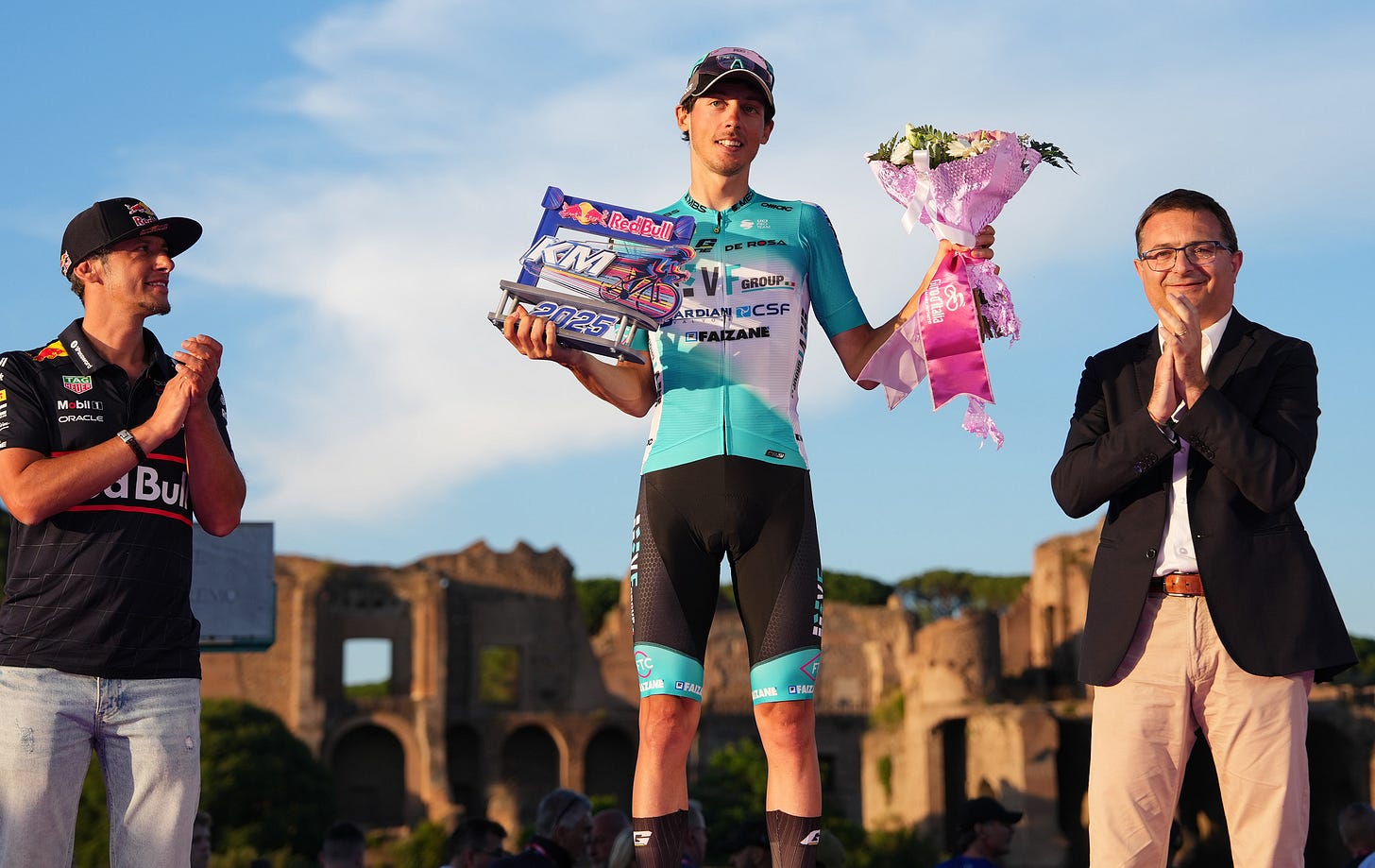
19th VF Group-Bardiani CSF-Faizanè
UCI points: 400
Finishers: 6/8 (Alessandro Pinarello DNS stage 6; Alessio Martinelli DNF stage 16)
Best overall: Luca Covili 70th
• It’s nine years since Bardiani won a Giro stage – Giulio Ciccone at Sestola in 2016 – and they didn’t look like repeating it.
• But five top ten finishes were about par for a wild card team. The best result being Filippo Magli’s fourth place at Cesano Maderno (stage 18) after being in the break.
• They had riders in the breakaway on 13 of the 19 road stages.
• Manuele Tarozzi won the overall Red Bull KM classification and the Fuga prize for spending more kilometres off the front of the bunch than anyone else.
18th Team Polti-Visit Malta
UCI points: 412
Finishers: 8/8
Best overall: Davide Piganzoli 14th
• Like VF Bardiani, they were represented in the break on 13 of the 19 road stages.
• Mirco Maestri was second at Cesano Maderno.
• Piganzoli was 14th overall, the second best result for a rider from one of the teams awarded a wild card. That gave him fourth place in the best young rider classification, after the two riders who beat him at the 2023 Tour de l’Avenir (Del Toro and Pellizzarri) and Max Poole.
17th Q36.5 Pro Cycling
UCI points: 552
Finishers: 7/8 (Nickolas Zukowsky DNF stage 4)
Best overall: Tom Pidcock 16th
• The team’s Grand Tour debut was not quite the fairytale Doug Ryder was hoping for. He had targeted stage wins (plural) and a top five finish.
• Pidcock had trouble on the gravel stage and never managed to get into one of the big breaks that might have given him a shot at a stage win, probably because he was too well-placed overall.
• Matteo Moschetti was third in the final sprint in Rome.
• They’ll hope it’s part of the learning process for the Vuelta a España later this year.
16th Jayco-Alula
UCI points: 612
Finishers: 6/8 (Koen Bouwman DNS stage 9, Luke Plapp DNF stage 17)
Best overall: Chris Harper 23rd
• A brilliant solo stage win for Luke Plapp after a 45km break on stage eight to Castelraimondo, the first break of the race to make it to the finish.
• Another brilliant stage win for Chris Harper – though completely overshadowed by Simon Yates’s heroics on the Finestre that day.
• Despite the absence of a GC challenge, two stage wins represents success for a team in transition and one that came into the Giro digesting the news that long-standing sports director Matt White was no longer part of the management.
15th Alpecin-Deceuninck
UCI points: 680
Finishers: 7/8 (Juri Hollmann DNF stage 6)
Best overall: Quinten Hermans 85th
• Kaden Groves got the win he came for, albeit in strangely underwhelming circumstances at the end of the bizarre, part-neutralised stage to Napoli.
• The Australian was also second in Nova Gorica and Rome but was never in the hunt for the points competition, such was Mads Pedersen’s dominance.
14th Soudal-Quick Step
UCI points: 690
Finishers: 6/8 (Mikel Landa DNF stage 1, Paul Magnier DNS stage 16)
Best overall: James Knox 19th
• Disaster on stage one when Mikel Landa crashed heavily, fracturing his vertebrae. That robbed the team of any serious GC threat and forced a hasty re-evaluation of resources.
• Grand Tour debutant Paul Magnier mixed it in the sprints a few times and finished third in Napoli.
• Ethan Hayter was ninth and third in the two time trials.
• Matteo Cattaneo was a very good fourth in the longer Tuscan time trial but otherwise quiet until he got into a flurry of breaks in the last week.
• Gianmarco Garofoli was fourth at Sestrière.
13th Tudor Pro Cycling
UCI points: 724
Finishers: 7/8 (Marco Brenner DNF stage 19)
Best overall: Michael Storer 10th
• Michael Storer’s performance at the Tour of the Alps last month suggested a top 10 GC result would be about par for the Giro, and he achieved it.
• Florian Stork got the team’s best stage result – second behind Carlos Verona at Asiago.
• Maikel Zijlaard had a third place (Lecce) and a sixth (Napoli) in the sprints.
• Larry Warbasse was in with a shout of being The Cycling Podcast’s first Grand Tour stage winner – until Nico Denz’s decisive attack on stage 18.
• Alexander Krieger was last man overall, 6hr 25 down on the winner.
12th Decathlon-AG2R La Mondiale
UCI points: 800
Finishers: 7/8 (Geoffrey Bouchard DNF stage 1)
Best overall: Nicolas Prodhomme 15th
• A month or so ago, Prodhomme had never won a race. That was until he and his young teammate Paul Seixas pulled off a tremendous two-man break at the Tour of the Alps. Winning breeds confidence because at Champoluc, Prudhomme was the worthy winner of a stage that was the hardest on paper, in terms of metres climbed, but felt otherwise fairly decaffeinated.
• Geoffrey Bouchard had to abandon the Giro after falling on the same corner as Mikel Landa on stage one.
• Dries De Bondt won the Traguardo Volante (intermediate sprints) competition – a reward for getting in half a dozen breaks that gave him the chance to sweep up points.
11th Movistar
UCI points: 992
Finishers: 8/8
Best overall: Einer Rubio 8th
• A solid GC campaign for the Colombian Rubio, although he may be disappointed not to better last year’s seventh place, or come closer to winning a stage.
• Orluis Aular had six top ten finishes, including third at Tirana and Vlorë but Movistar and sprinting always has a bit of a José Joaquin Rojas feel about it.
• A very quiet Giro for Davide Formolo. He was 45th and got in a couple of breaks but that was it.
• A so-so sixth in the teams classification, a competition they usually prioritise.
Next time in The 11.01 Cappuccino: The top 10 Giro d’Italia teams, ranked by the number of UCI points they scored.




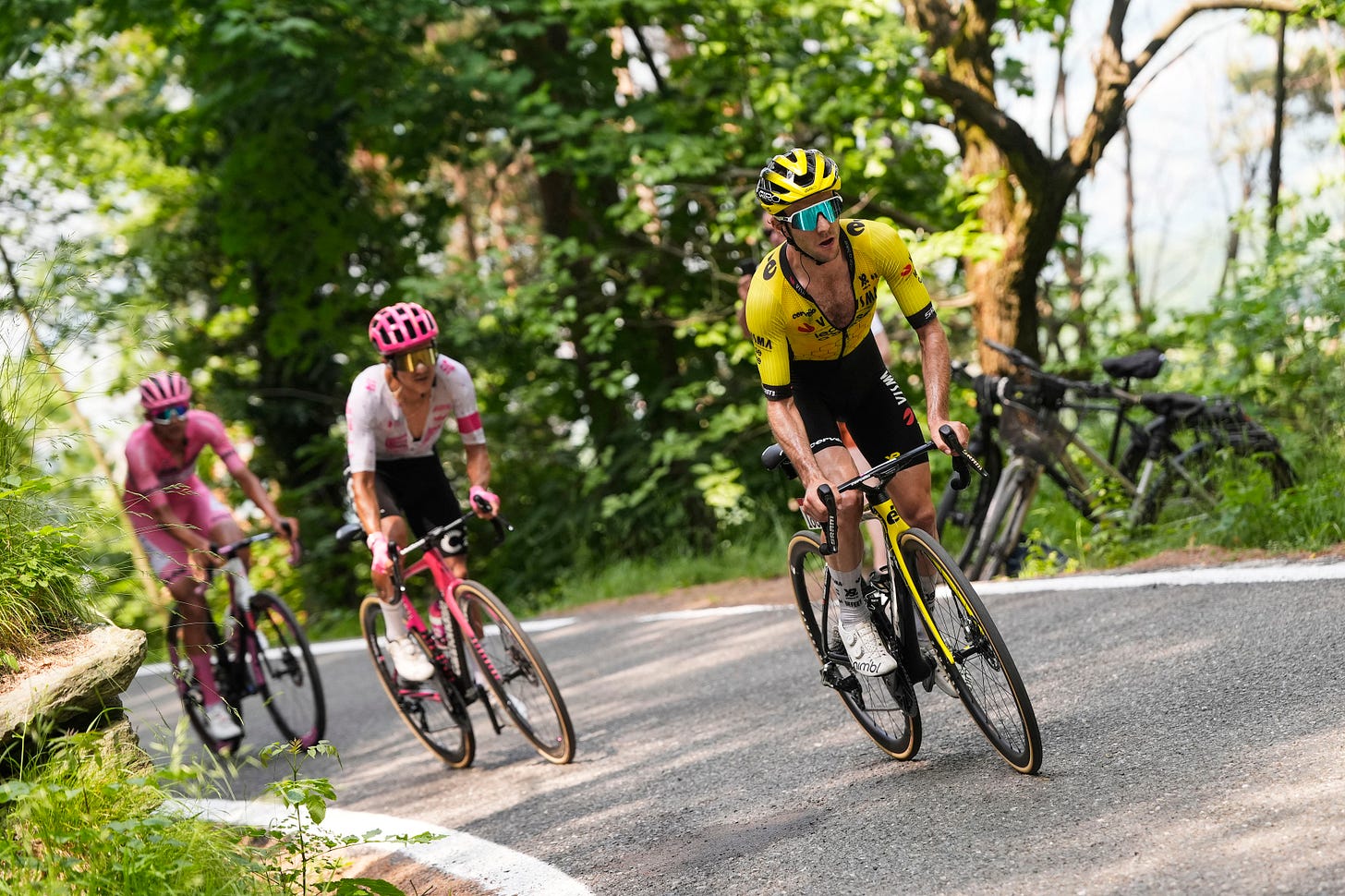
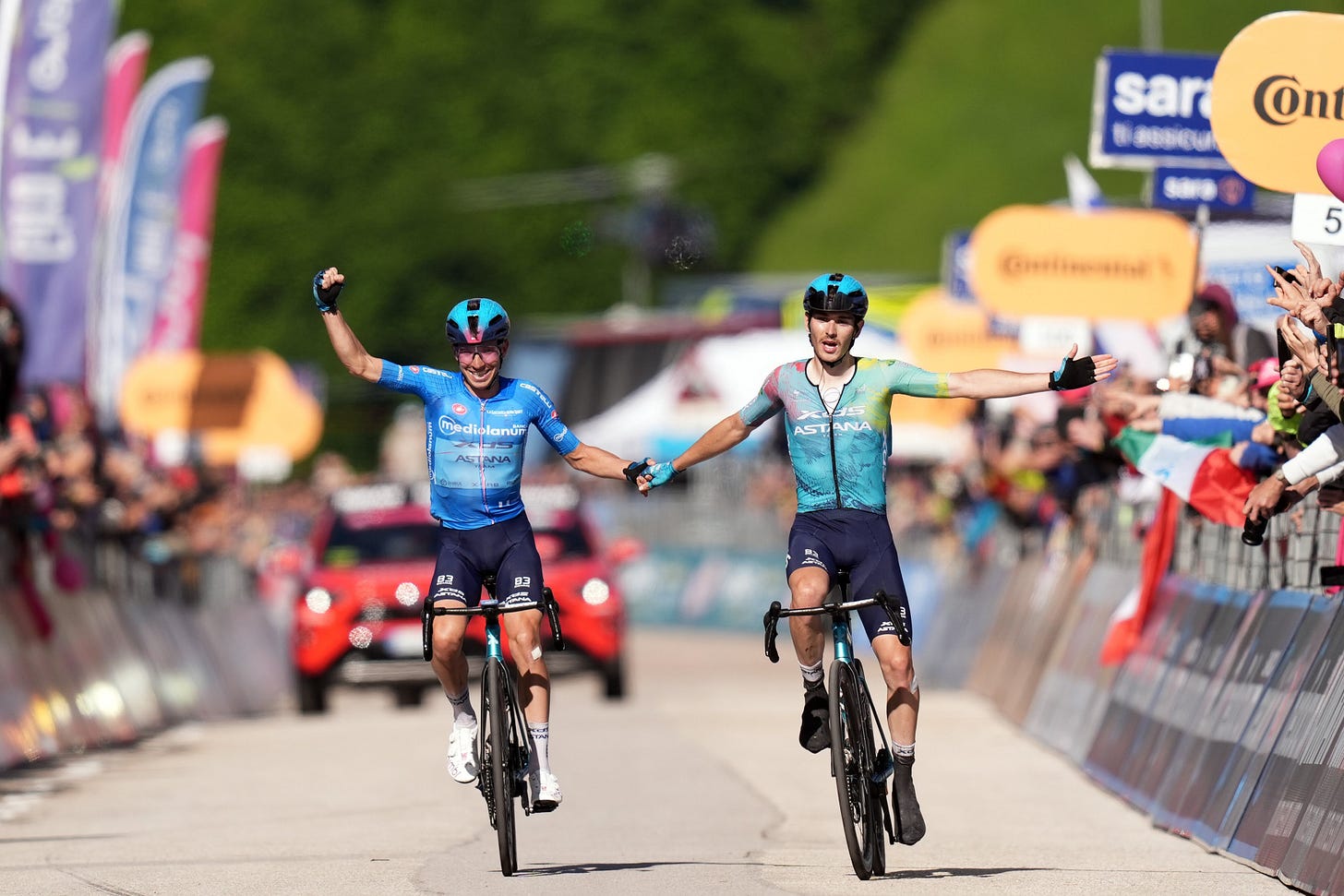
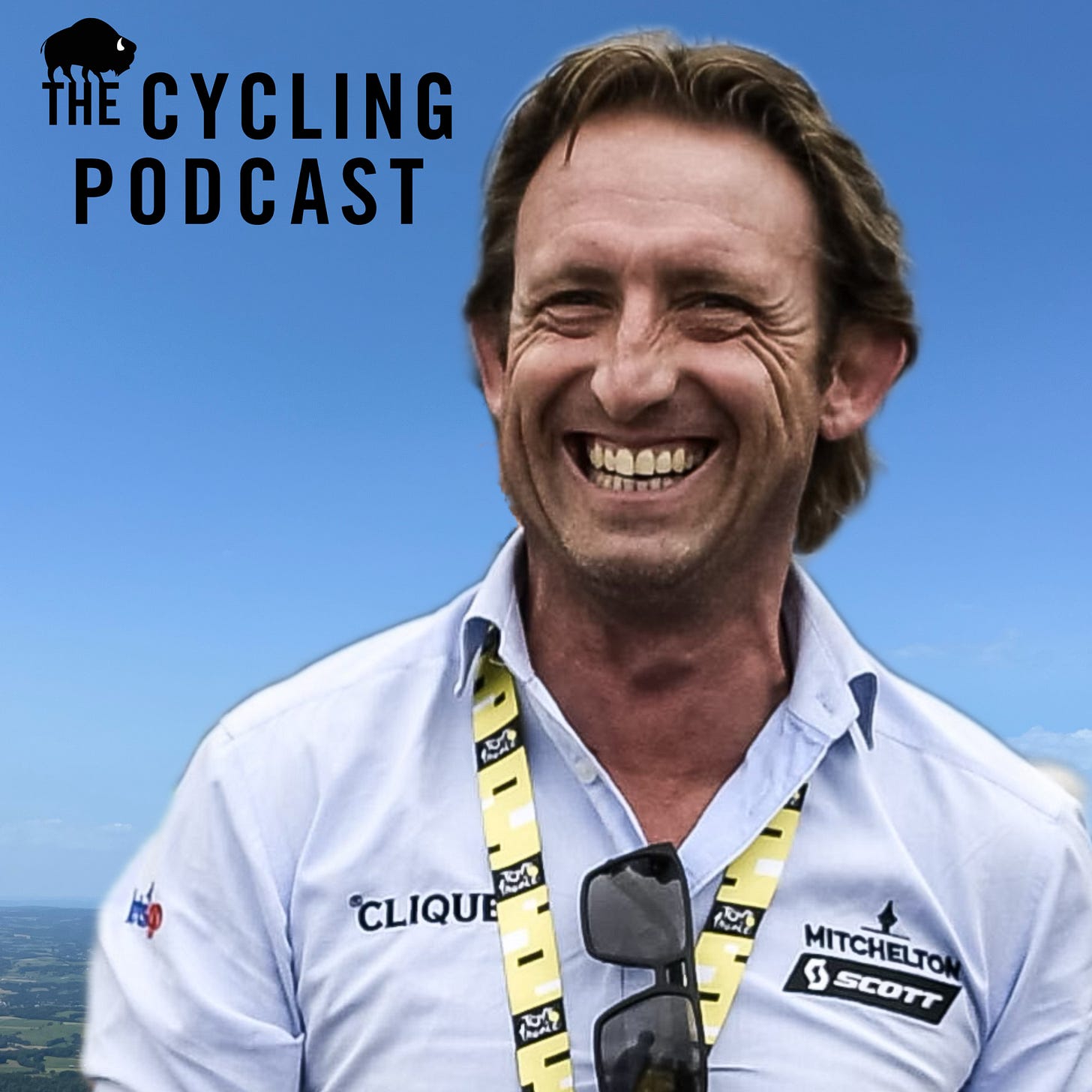
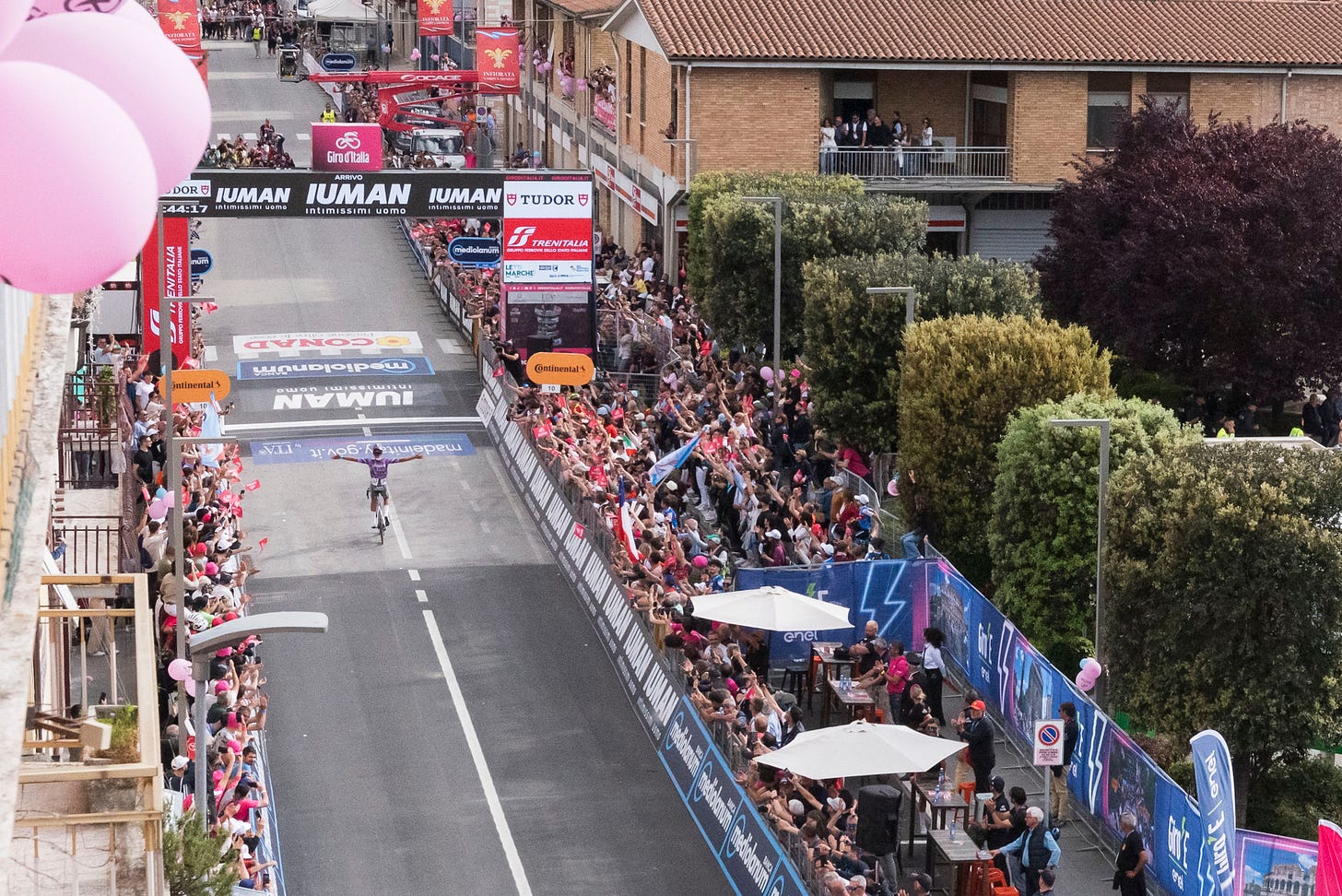
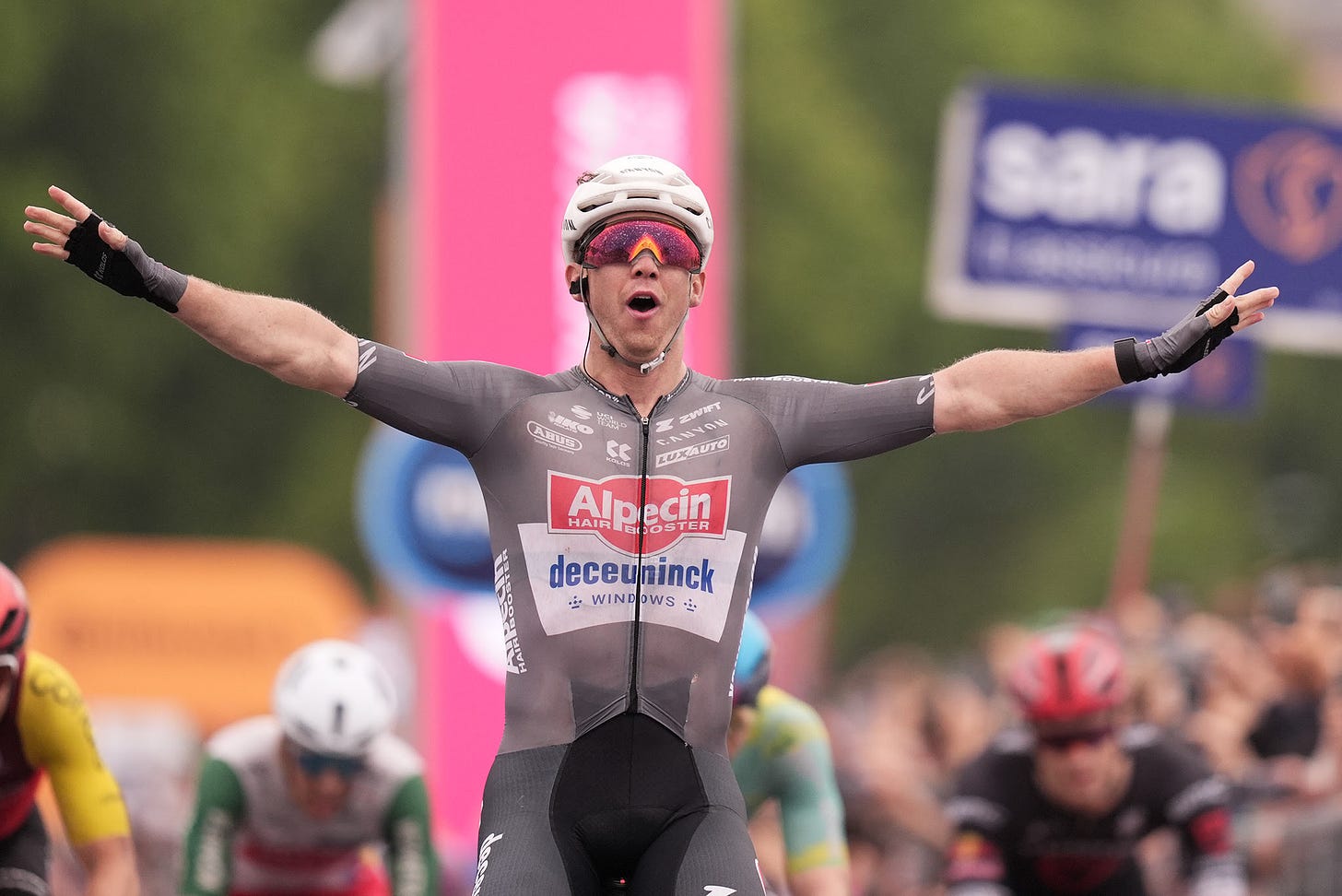
I have enjoyed the evolving conversation around Carapaz & del Toro's Finestre tactics. The coverage on the day, the immediate analysis, online reactions, then how the dust has settled in the following days. Yates' performance and the nuance of how his competitors responded is peak GT and why that stage has done so much heavy lifting for an otherwise intriguing but forgettable Giro.
Strade Bianche stage. Appointment viewing yes but only for hard-core cycling fans. Until broadcasters/commentators find away of showing/explaining where all the major protagonists are during the race a stage like that is impenetrable for the casual fan or viewer